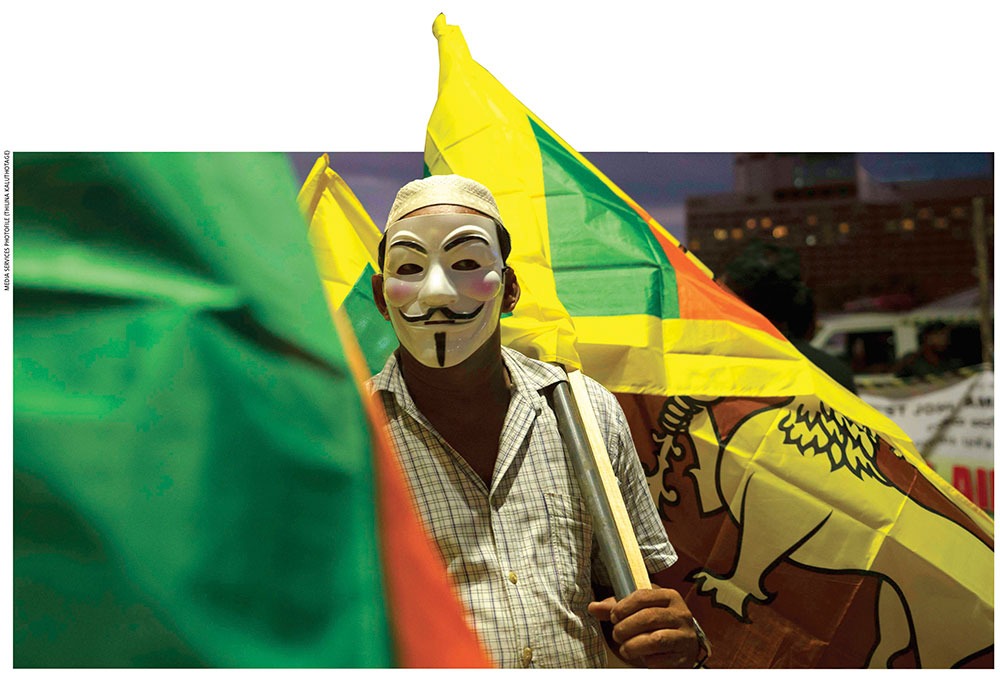STATE OF THE NATION
The National People’s Power (NPP) has been at the helm of state for a year, recently commemorating the election of an executive president from outside traditional political ambits.

VIEWPOINTS
A GOOD TIME TO BRIDGE THE GREAT DIVIDE
Wijith DeChickera yearns for a happy season in which an island under the sun can bury the hatchet of its chequered past for the greater good

This month, the Janatha Vimukthi Peramuna (JVP) led NPP coalition commemorates the first anniversary of its parliamentary entry with a majority supposedly set to effect a paradigm shift in politics.
It is ambrosia for those who yearned for the eviction of entrenched elites and their crony culture of systemic corruption that led the nation to ruin – including bringing Sri Lanka to its knees clutching the begging bowl of bankruptcy.
Where the JVP long campaigned on a platform of ‘system change’ lay the smoking embers of the aragalaya, a citizens’ movement that brought popular sovereignty to the fore in 2022…
Widely seen as a formal extension of sociopolitical aspirations expressed by the unprecedented people’s uprising, it was expected that the new regime’s tenure in parliament would usher in a cleaner political culture and more accountable governance.
However reluctantly the power centres of city, chamber and cocktail circuit may acknowledge it, there was hope – among the masses in the main – that a fresh administration would walk the talk on the promises it had made to the people.
These spanned the spectrum from effective anticorruption measures, recovery of national assets allegedly pilfered from state coffers under previous dispensations and re-establishment of public trust in government, and ushering in an era of relief for the masses on intolerable socioeconomic burdens.
A year later, it’s incumbent on the people it represents, as well as the rest of civil society who do not naturally comprise the JVP’s electorate, to ask if all is well…
Kudos to the NPP for alleviating some of the taxpaying public’s burdens. These measures include amending PAYE taxes and revising tax brackets to raise the tax-free threshold.
Other relief to citizens such as monthly financial grants to low income families, senior citizens and those suffering chronic illnesses shows that the regime is serious about its social protection agenda.
In the political domain, a small cabinet of 22 cabinet ministers and 29 deputies – with no superfluous state ministers – proves the case for cutting waste through small government. The conducting of local government elections for 339 of 341 wards was a plus too.
Hope the commitment to conduct Provincial Council (PC) elections in 2026 eventuates so that Sri Lanka can keep its promises to itself and honour the internationalism of which it is a part.
On the sociopolitical front, the long delayed abolition of the draconian Prevention of Terrorism Act (PTA) Act No. 48 of 1979 and its replacement – following a process of civic consultation with a cross section of national stakeholders – with a new law more amenable to a nation keen to beat its swords into ploughshares was a salutary development.
It remains to be seen if new antiterrorism laws also prove to be a Damocles’ sword hanging over dissenters as civil society activists have pointed to problematic clauses where poorly defined concepts may criminalise free speech and give government broad powers of arrest and detention, which would be an ironic case of smuggling the PTA back into circulation.
The socioeconomic reforms undertaken by the incumbent regime must redound to the insistence of the IMF that Sri Lanka continues to tighten its belt to keep on the straight and narrow of economic recovery.
That key indicators of such resurgence may be overshadowed by the country’s fiscal, monetary, tourism and exports development policies, ahead of recommencing sovereign debt servicing, might be cause for some concern especially for a small ailing country walking a tightrope with no allowance for unexpected external shocks.
Where the NPP can store up future electoral credit for itself while winning big for the nation at large is in the much muddied and long neglected arena of national reconciliation.
While November in particular can be a contentious month – with sundry commemorations raising ire in some corner or the other of this minefield – government will have to tread judiciously as to how it handles war victories and victim memorials.
If the JVP would be confessional and apologetically seek forgiveness for its own chequered past, it could go no small distance towards gaining the confidence of key segments of civil society that still view it with suspicion… or even reject its mandate.
As well as set the tone for a new nationalism that is not based on race, creed, party or religious beliefs but rather, built on a freshly unified if still fragile identity that Sri Lanka needs to develop to emerge from the doldrums of the past.
Of course, all of this may well be considered a fantasy of liberals at best if by the end of 2028 we don’t boost productivity, bolster forex earning exports substantially and bulwark a newly digitalised bureaucratic efficiency.
Because fortified national unity has no survival value in purely economic terms. Instead, it is what gives our very survival value.





